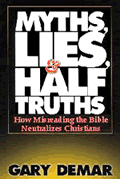Other
Heidi
Articles:
THE AGE OF PHILOSOPHICAL MORALITY
Heidi
Cappadona
December 2, 2005
NewsWithViews.com
Mr. Thomas Paine, in his Age of Reason, said, �Let us devise means to establish schools of instruction, that we may banish the ignorance that the ancient regime of kings and priests has spread among the people. Let us propagate morality, unfettered by superstition.� At the time it was written, it was not well accepted on both sides of the Atlantic and Paine earned himself strong indignation from the citizens of the United States who�s government was founded on the very principles that he claimed were mere superstitions. Back then his ideas, widely viewed in the light of Christianity, were seen to be the folly that they are.
Today, philosophical morality is the main focus of our public schools as if Paine were again alive and well. Today many people believe schools without religion are protecting children from the confusing influence of religious controversies and the clashing doctrines of various sects allowing them to make up their own minds towards religion when they are mature enough to entertain such thoughts. These new educators believe religion is not necessary to morality; that benevolence may be insured by habit, and virtues may flourish if safely left to chance. However, what begins as protection for them, allows them to be lost in darkness tending to destruction and mischief.
The earliest and most urgent intellectual want of human nature is the knowledge of its origin, its duty, and its destiny. One of the first inquiries of the human mind is, �Will I always be here?� Reasoning with what one sees occurring to others all around, a child soon learns that what he is must change and before he knows his origin and his destiny, he learns he must someday die. Then comes that most urgent and solemn need for light, that question which proceeds from the human soul, �Shall we live again?� That most important question nothing but God and the religion of God can solve and without that answer, we are left in darkness devoid of light and hope.
In darkness, there is no need for morality because there is no consequence for actions other than punishment from men whose ideas of morality change like shifting sand. A child emerging from today�s schools will surely find the thought of religion one of folly and fairytales which are best left behind in childhood.
Morality without sentiment, benevolence towards man, without a sense of responsibility towards God, the duties of this life performed without any reference to a life which is to come; this is the sentiment of the useful education of today. Children are taken into public schools at the tender age of six and kept until they reach maturity and can enter into society. Before they can read, they enter into a school without God; schools which throw the doors open wide to opposers and revilers of any form of Christianity and shut them tight only to its supporters. Today, the upholders of Christianity are never allowed to be heard within those walls while the voices of those who impugn Christianity may be heard raised high and loud until they shake the walls of the building. Is this an accident? We must remember, he who rejects the ordinary means of accomplishing an end means to defeat that end itself, or else he has no meaning. Philosophical morality is intended to replace our religious morality and destroy our foundation.
The first step of any philosophical moralist is to attack the agencies through which religion and Christianity are administered; the children, the family, and the inspired Word of God. It is widely known that there are certain great religious truths which are admitted and believed by all religions. All believe in the existence of a God, the immortality of the soul, and the responsibility in another world for the conduct in this one. Up until about 100 years ago, most also believed in the divine authority of the Word of God. These simple truths are the foundation of mans� responsibility for his behavior toward others and is the basis for all civil societies.
This idea that there are too many conflicting doctrines and beliefs is not a new concept. At the meeting of the first Congress there was a doubt in the minds of many of the men whether to open the meeting in prayer with the reason being that there was a great diversity of opinion and religious belief. Mr. Samuel Adams rose and said that it did not become men, who had come together for solemn deliberation in the hour of their extremity, to say that there was so wide a difference in their religious belief, that they could not, as one man, bow the knee in prayer to the Almighty, whose advise and assistance they hoped to obtain.
What would become of society if we simply threw away responsibility for men�s behavior and tore away the foundation from which that responsibility flowed? We may as well put out the sun and light the world with a thousand candles. We have a body of laws in this country in relation to which differences of opinion are as innumerable as the stars and clashing opinions arise daily to a far greater extent than any in the religious world, yet the Constitution has upheld this government as its firm foundation for over two hundred years. The Constitution is upheld by a thousand or more years of the laws of nature which are common laws and the common laws are upheld by the Supreme laws of God. We hold life, liberty, and property in this country upon a system of oaths founded upon a religious belief of some sort.
That system that would strike at that foundation, destroys the safe possession of life, liberty, and property, and destroys all institutions of civil society. It is impossible to administer the laws in our country without taking into consideration the religion or scripture to which the defendant in error has scoffed at. To lay aside this firm foundation of God is to weaken the confidence in human veracity and true morality which is so essential to the purpose of society. Without it, there can be no question of property and no criminal could be brought to justice. While many things about religion are disputed or dark, most can plainly see its foundation, its main pillars of great truth. Only those who do not value Christianity in any form cavil about sects and clashing doctrines.
We are engaged in a war and have been for some time. Most of us aid the enemy by telling our children to be good for goodness sake but neglect to tell them to be good because God has commanded it and will require accountability. We are raising an enormous wave of future men and women who have no foundation and no accountability and sadly those children lucky enough to have Christian parents, generally hold in their hands a paraphrased word of God, one the world has convinced them is �easier to understand and in today�s English� but has within it no power of the authority of God because it is not �an original, handwritten by the apostles themselves.� When it comes time for these children to fight oppression and the evils of this world, they will be most helpless, having only man-centered morality as a foundation and no sword of truth for the battle.
� 2005 Heidi Cappadona
- All Rights Reserved
Heidi Cappadona lives with her family in Cape Cod, Massachusetts.
E-Mail: heidi@rightbooks.net
The first step of any philosophical moralist is to attack the agencies through which religion and Christianity are administered; the children, the family, and the inspired Word of God.












